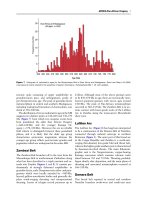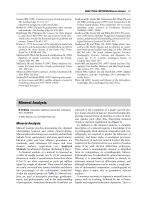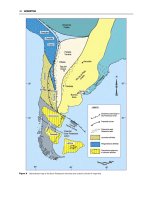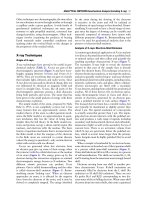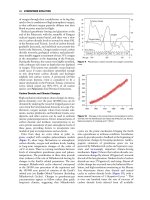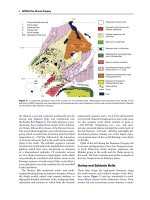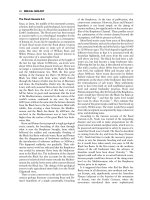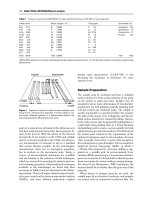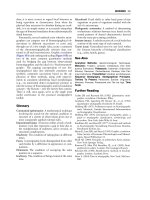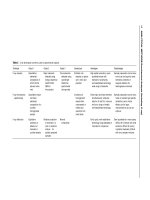Encyclopedia of geology, five volume set, volume 1 5 (encyclopedia of geology series) ( PDFDrive ) 1257
Bạn đang xem bản rút gọn của tài liệu. Xem và tải ngay bản đầy đủ của tài liệu tại đây (60.25 KB, 1 trang )
GEOLOGY, THE PROFESSION 75
evolved until 3 years of education were required to
receive a Batchelor of Science degree, or 4 years with
Honours. Most universities now offer postgraduate
Master of Science degrees, involving 1–2 years work,
through thesis and/or examination, whilst Doctor of
Philosophy (PhD) degrees may take between 3 and 5
years of research to complete. In Europe, this may
take up to 10 years. In general it is considered that
most geologists need to complete at least 5 years of
education before becoming suitable for a long-term
geological career.
The Learned Societies
In order to cater for all the interests of these geologists, various bodies came into existence. They fall
into the categories of learned and technical societies,
but a new function or even a new type of society has
evolved with the recent birth of the professional
societies (see Geological Societies).
We see that the major national societies such as the
Geological Society of London, the Union Franc¸ ais des
Geologues, and the Ilustre Colegio Oficial de Geo´ logos cater for many areas of geological life and interest, especially when they are able to set up special
interest groups. The specific concerns of large groups
of specialized geologists, especially when these are of
a global nature, have lead to the establishment of
large organizations such as the International Association of Engineering Geologists, the European Union
of Geological Sciences, the Petroleum Exploration
Society of Great Britain, the Micropalaeontological
Society, the International Association of Hydrogeologists, and the Society of Exploration Geophysicists. All cater for a particular area of geological
interest, and most produce a journal carrying technical
peer-reviewed articles.
The Professional Bodies
The evolution of the professional geologist, working
in academia, government, or industry, has lead to
the need for organizations to look after them. Some
learned societies, such as the Geological Society of
London, have evolved easily to cater for this new
function. In Ireland it was necessary to create a new
independent body – the Institute of Geologists of
Ireland – to look after Irish professional geologists,
and in the USA the American Institute of Professional
Geologists took on this role. The European Federation of Geologists (Figures 2 and 3) took on the
continental role of representing the national associations, some of which were professional bodies
and others learned societies. Similarly, in Canada
the Canadian Council of Professional Geoscientists
represents the professional interests of the provincial
bodies (Table 1).
All of these bodies are striving towards the same
goal of ensuring professional standards and representation. They are establishing mutual recognition and
other agreements to benefit their members worldwide.
The Profession
The practice of geology occurs in three principle
areas: academic, governmental, and industrial.
Clearly, the teaching of geology is crucial, and it is
amazing that so little is taught in primary or secondary schools; geology is simply seen as a small aspect of
geography! It is in tertiary education that geology
comes into its own, and universities develop courses
that give the neophyte geologist a grounding in so
many disciplines. So, most geologists working in academia are based in university geology departments,
though some may be found in the allied disciplines of
geography, archaeology, etc. Some can also be found
in Schools of Mines or Technical Institutes, where
they instruct mining geologists, geosurveyers, and
geological technicians.
In Government, the traditional area of practice has
been in geological surveys. These have long been seen
as the providers of modern geological maps, and this
is indeed one of their main functions. It has been
interesting to see the variation in the response of
geological surveys around the world to modern
changes in such areas as digital data management.
Those surveys that have remained traditional have
come under great pressure, and some have had to
close. Others that understand the demands of the
digital era have been quick to adjust to being data
managers and providers, not just map makers, and so
have become a necessary organization rather than an
‘appendix’. Consequently, geologists working in these
areas have also developed their geological skills, often
into new areas such as heritage or marine. Other
bodies have also created opportunities for geological
employment, and in the last few years departments
such as Environmental Protection Agencies have
sprung up to look after the world we live in. Geology
naturally also has a role to play in the supply of
renewable energy, allowing countries to be less reliant
on fossil fuels.
Industry is a huge area of employment for geologists. The supply of fossil fuels or mineral resources
depends on the geological setting and on the location
of the deposit to be exploited. So a geologist must be
mobile and able to travel to any part of his or her
country and even to any part of the world if necessary.
Consequently, an ability with foreign languages can
be highly advantageous at times. However, in the area
